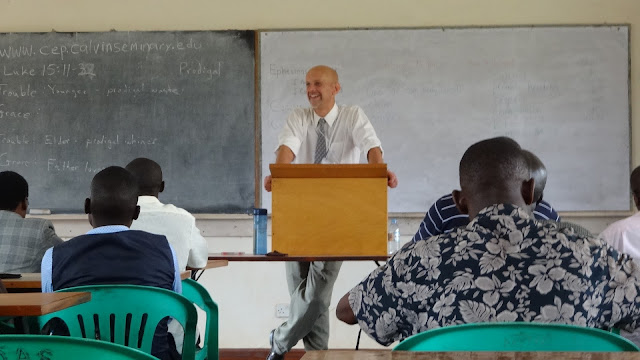By Anthony:
Recently I had the opportunity to attend the TEA conference (Theological Education in Africa) put on by CRWM (Christian Reformed World Missions) in Kampala. The conference was quite good, but I especially enjoyed the fellowship. Rarely have I ever been with so many people I know, from so many different areas of my life, all in one place.

I won't bore you with a bunch of names of the people who attended, but of the 300 or so participants included: about 20 of my church leader friends in Soroti (including my co-leaders with TLT), several students I had at Pentecostal Theological college 5 years ago, a couple of my Calvin Seminary professors, a couple CRC pastors from the US, the regional TLT leader who lives in Kenya, a World Renew Kenya colleague, and CRWM friends. In addition I got to meet the CRCNA's new executive director, Steve Timmermans, whom I very much enjoyed talking to. He is the right man for the job. I also met pastors from all over Africa, stretching from South Africa to Ethiopia.
Taking the Lord's Supper with such a gathering of people like this was very meaningful after many sermons about unity over the week. I also attended a sort of reunion or union meeting with all the TLT members from all over Africa to hear about what God is doing.
Throughout the week, I participated in two workshops. From Steve Timmermans, I had the privilege of learning how to better include people with disabilities in the full range of church life and worship. This is a huge issue in Africa. Many people with disabilities are just shut inside their homes as children, as the parents don't really know how to deal with them and are ashamed of them. I can't imagine how painful and lonely some people's lives are just because they have certain disabilities. Thankfully some pastors are creating awareness and teaching the Church, and learning to treat people with these issues as real people and valuable members of the church. Change is slow, but it's happening.
I also took a workshop on preaching and the Gospel of Luke, with David Rylaarsdam from Calvin Seminary, which I really enjoyed. The TEA staff assigned me to be prefect (class assistant) for that class, so that was pretty funny and fun.
One passage we focused on was Jesus' transfiguration (Luke 9). I never knew how to preach on this passage and definitely hadn't thought about it enough. Studying it was powerful for me personally. We discussed how Jesus was getting ready to go to Jerusalem, to his death, and had just been teaching his disciples that they would have to follow him in suffering. The disciples probably had trouble understanding. Then in the Transfiguration, Jesus was clothed with glory. What I now understand was that it was a foretaste for Jesus, like an encouragement to him, that at end of his suffering awaited glory. He talked about his upcoming death with Moses and Elijah. It was a comfort to him as he prepared to grit his teeth to go suffer and die in Jerusalem.
The disciples wanted to shortcut the suffering and stay in the glory and build tents on the mountain. But the glory only comes after the cross. To me this was powerful in thinking about my own life and suffering I have gone through. I used to just say to myself, "
Jesus promised us we would suffer for following him, so just deal with it, and grit your teeth." But now, I feel I have a more balanced understanding. Now I can say, "
Jesus promised us we would suffer for following him, so I must grit my teeth and face it, and yet I know this suffering is temporary and I will one day be transformed in glory as Jesus was."























































